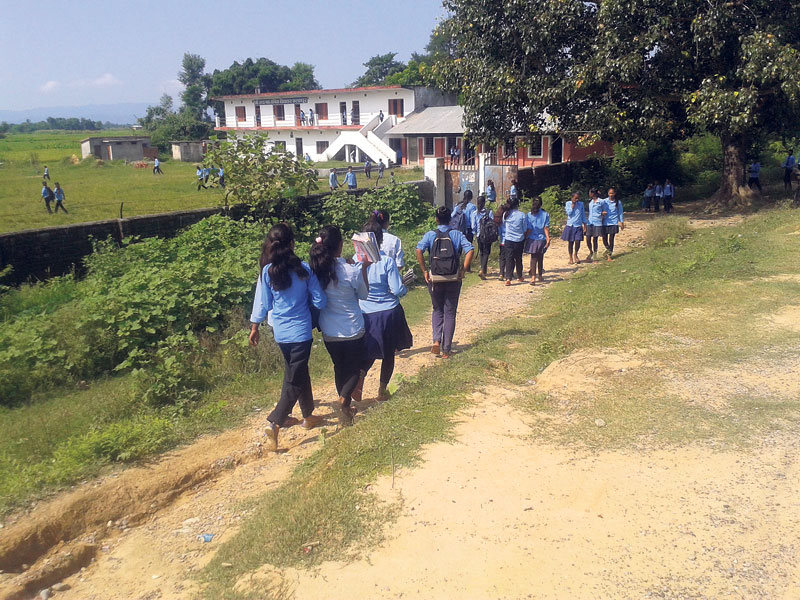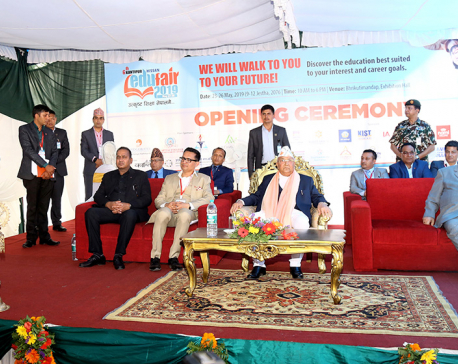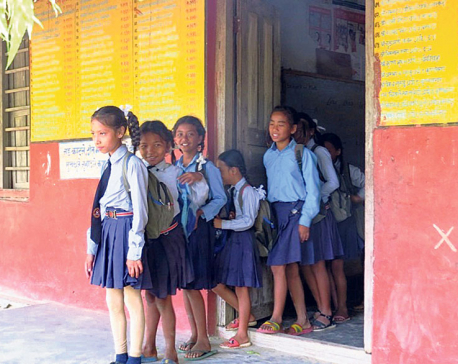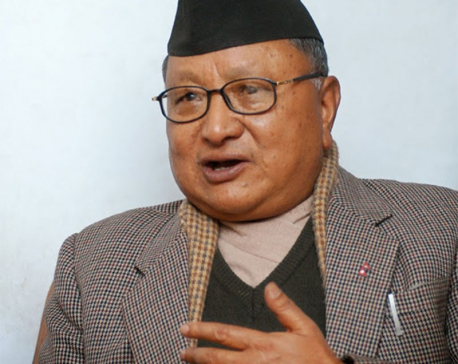
OR
Government school's dilemma: Free or quality education?
Published On: January 17, 2017 01:30 AM NPT By: Devendra Basnet

DANG, Jan 17: A state-run primary school, Ratri Primary School, in Ghorahi - 3 decided to enhance the quality of its education by adopting private school policies in terms of grading of classes, medium of instruction, extra-curricular activities, among others, six years ago. Newly added classes- Nursery, LKG and UKG - got quite popular among parents instantly. Two teachers who could instruct students in English were hired by the school management. Since there was no government quota for them, the school paid their salary by catering resources from parents.
The school talked to guardians and a written agreement was signed that they would pay certain amount as annual fees of their ward to facilitate the newly introduced services. Things were going on pretty well until last year. District Education Office (DEO) sent letter to the school stating that it cannot charge fees to guardians. The DEO's notice was part of the government's decision to strictly ensure that no government school charges fees in any form to the children. The directive forced the school to close the pre-primary classes.
“We do not have required human resources to continue the service. We were managing human resources through the financial support provided by the parents. Though the parents were willing to it, the DEO objected to it. So we scrapped the service,” said the school's principal Laxmi Man Chaudhari. He added that the DEO's notice actually affected the parents. “There is another one private teacher here and we are struggling to pay his salary,” he added.
Naradevi Secondary School located at Dhikpur states that the policy of zero fees cannot work until and unless the government is able to send adequate number of teachers to all schools. “Some schools have teachers more then required, while there's dearth of teachers at some schools. This disparity should be addressed and the government must invest adequately in the education sector,” opined Amar Bhandari, a teacher at the school.
Bhandari informed that the school has been charging between Rs 200 to Rs 1200 for students from one to 10th grade annually. From this year, the school has decided to double this amount which he termed as 'support'. “If we do not ask for support from the parents in the form of annual feel, we won't be able to run the school,” he asserted.
“Without that support, we will have to pack up things and head home. There won't be school from tomorrow.”
Through the fees, the school affords salary of four privately appointed teachers. Bhandari informed that to pay these teachers through the school's own resources is not possible. Due to resource crunch the school has not been able to pay government approved pay scale to its teachers. “Government's minimum pay scale for a lower secondary teacher is Rs 25,500 but here the privately-appointed teachers are getting just Rs 12, 000 per month,” he said.
If we do not ask for support from the parents in the form of annual feel, we won't be able to run the school.
-- Amar Bhandari, a teacher at the Naradevi Secondary School, Dang
These are just examples. Almost all the schools in the district have been charging certain fees to students 'stating that the support is imperative to run schools'. In most of the cases, guardians have been supporting willingly, as the matter is discussed and decided mutually. Written agreement is made during parents' meet and the annual fee is decided. The annual fee is collected during the admission or new academic session.
As per the government policy, the student teacher ratio in a class should be 50 to one. But in lack of proper implementation of this policy, several schools are either over or understaffed. Basically in remote areas, school management is seen poor. Acting District Education Officer, Dandapani Ghimire admits that the government has been struggling to adjust teachers' quota fairly in all schools.
“Though the government policy does not allow raising fees from parents, it has become a kind of compulsion for schools to seek such support. It is true that there is a huge disparity in teachers' placements,” he said.
He stated that reshuffling teachers' posting on the basis of student's number, would ease crunch of teachers in schools to a great extent. At least at the primary and lower secondary levels, this issue can be resolved to a great extent, he said. “For this all concerned stakeholders including the professional teachers' associations should work together,” he said.
There are total of 421 schools, including primary, lower secondary and higher secondary, in Dang that are manned by 1,765 permanent teachers and 697 relief-quota teachers.
You May Like This

PM Oli urges community, private schools to ensure quality education
KATHMANDU, May 23: Prime Minister KP Sharma Oli has called on community and private schools to work for the enhancement... Read More...

Madi municipality to merge schools for quality education
CHITWAN, May 29: Disproportionate tea-cher-student ratio, lack of infrastructures and poor management committees are common problems of community schools in... Read More...

Rights of every student to quality education secured: Education Minister Shrestha
KATHMANDU, June 14: Deputy Prime Minister and Education Minister, Gopalman Shrestha has said that the right of every student of... Read More...






Just In
- Challenges Confronting the New Coalition
- NRB introduces cautiously flexible measures to address ongoing slowdown in various economic sectors
- Forced Covid-19 cremations: is it too late for redemption?
- NRB to provide collateral-free loans to foreign employment seekers
- NEB to publish Grade 12 results next week
- Body handover begins; Relatives remain dissatisfied with insurance, compensation amount
- NC defers its plan to join Koshi govt
- NRB to review microfinance loan interest rate











Leave A Comment